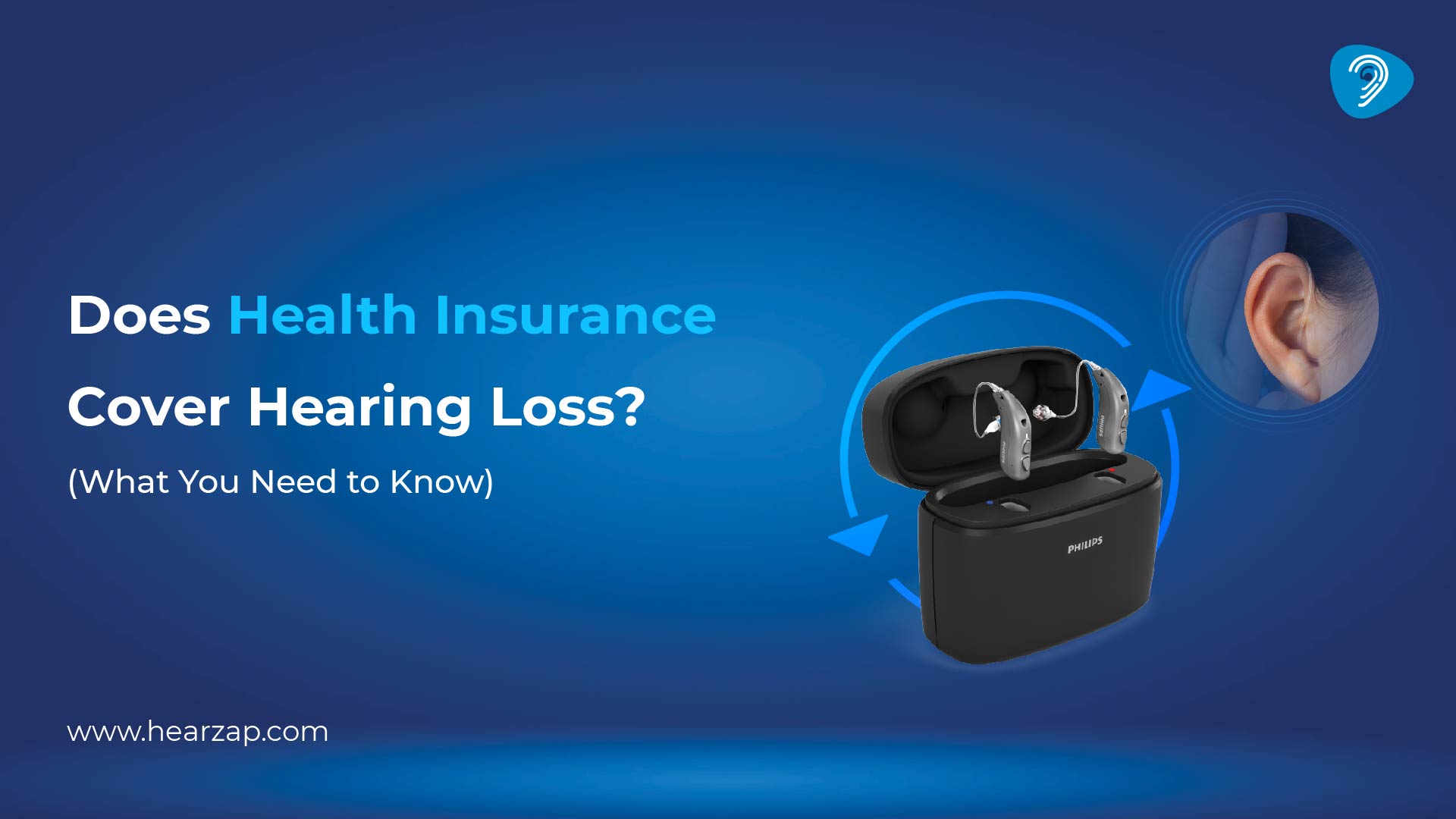HEARING AIDS
Does Health Insurance Cover Hearing Loss? What You Need to Know
By Team Hearzap | Nov. 26, 2025

“Hearing aid insurance coverage” is a phrase many families search for soon after a diagnosis. The reason is simple: hearing tests, follow-ups, and devices can add up over time. People also ask, “Does insurance cover hearing aids?” The short answer is: sometimes, yes, but it depends on your plan, your country, and the way the policy defines medical necessity. This guide explains how coverage usually works, where it often falls short, and the smart steps you can take to save money while still getting the proper care.
If you are new to this topic, start with the basics of hearing loss and the types of hearing aids. That will help you read your policy with confidence and ask the right questions when you speak to your insurer.
Understanding Hearing Loss and its Costs
Hearing loss can show up slowly or all at once. Many people first notice that speech sounds unclear, especially in crowded rooms. Others realise they are turning up the volume more than before. A proper hearing test confirms the type and degree of loss and points to the right treatment plan.
Costs usually fall into a few buckets:
- Diagnosis and follow-ups: Screening, complete audiometry, middle ear tests, fittings, and periodic tune-ups.
- Devices: Hearing aids come in several styles and performance levels. Prices vary based on features like noise control, rechargeable batteries, wireless streaming, and water resistance.
- Care and consumables: Domes, earmoulds, wax guards, chargers, and routine servicing across the life of the device.
Because hearing aids last for years and require care, families look closely at hearing aid insurance coverage. Even a partial benefit can reduce the long-term spend. That is why it helps to understand how plans treat tests, devices, and aftercare.
Does Health Insurance Cover Hearing Aids?
The honest answer: coverage for hearing aids is not uniform. In India, most retail health policies focus on hospitalisation and day-care procedures. Many do not include hearing aids as a standard benefit. Some plans, however, may:
- Cover diagnostic tests when a doctor orders them.
- Offer OPD (out-patient) add-ons that reimburse consultations and investigations.
- Provide device benefits under categories like “prosthetics” or “durable medical equipment,” sometimes with sub-limits.
- Include specialised riders, wellness wallets, or corporate group policies that allow partial reimbursements.
In other countries, rules differ. For example, some employer plans or private policies may cover part of the device cost, usually with caps and waiting periods. Always read the fine print and look for the exact words used to describe hearing tests and devices.
If you are asking, “Are hearing aids covered by insurance?” the safest way to know is to check your policy wording and speak to your insurer. Even within one brand, benefits can vary from plan to plan.
What Factors Determine Hearing Aid Insurance Coverage?
Several pieces come together to decide your final eligibility:
- Type of plan:
- Retail health policies often exclude hearing aids but may cover tests.
- Corporate group policies sometimes include a device allowance or OPD wallet.
- International policies vary widely; some reimburse a portion of device costs.
- Medical necessity and diagnosis: Plans look for a clear diagnosis from a qualified ENT specialist or audiologist. If your policy uses “medical necessity,” the prescription and test results should support why a device is required.
- Referral and documentation: A doctor’s referral, audiometry reports, and a detailed device invoice are usually needed for claims. Keep every document, including serial numbers and fitting notes.
- Sub-limits, caps, and waiting periods: Even when devices are covered, there may be a fixed maximum amount per ear or per policy year, plus waiting periods before you can claim.
- Network and purchase channel: Some insurers require buying from approved providers or submitting pre-authorisation before purchase.
Understanding these factors helps you plan better and avoid surprises later.
Medicare and Hearing Aid Coverage Explained
Are Hearing Aids Covered by Medicare for Seniors?
Private and Employer Health Insurance Plans
Private and employer policies can be more flexible than standard retail covers. Here is how hearing insurance (or hearing-related benefits) might appear:
- OPD add-ons or wellness benefits: Reimburse ENT consultations and tests.
- Device sub-limits: A fixed amount for hearing aids once in a policy period.
- Corporate plans: HR-negotiated benefits may include partial device coverage, sometimes with a co-pay.
- Special riders: A top-up for assistive devices, including hearing aids, earmoulds, or cochlear accessories.
Remember, device coverage often comes with conditions: approved brands or providers, pre-authorisation, and caps per ear. Keep every prescription and invoice. When in doubt, ask your insurer to confirm in writing.
Steps to Check Your Hearing Aid Insurance Coverage
When you need a clear “yes” or “no,” follow these steps and save yourself back-and-forth later:
- Open your policy document and search for the terms: “hearing aid,” “prosthetic,” “durable medical equipment,” “OPD,” and “ENT.”
- Look for sub-limits or caps. Note if the limit is per ear, per device, or per policy year.
- Check waiting periods and any clauses for pre-existing conditions.
- Call your insurer and ask: “Is my hearing aid insurance coverage active under this policy? What documents do you need for a claim?”
- Ask for written confirmation by email or in your customer portal. Keep that email with your medical file.
- Confirm purchase rules: Do you need pre-authorisation? Are there approved providers or a network clinic list?
- Document everything: referral, audiometry reports, device quotation, final invoice with serial number, and fitting notes.
Tips to Save on Hearing Aids if Insurance Doesn’t Cover Them
Even without formal hearing aid insurance, you have many ways to manage the cost:
- Start with the right test: A complete evaluation helps you choose the right technology level. Book an online hearing test as a quick first step, then follow up with a full hearing test for accurate fitting.
- Choose features you will use: Premium models add comfort in very noisy settings, but mid-range options suit many listeners. Your lifestyle and work needs should guide the choice.
- Ask about trial and exchange windows: Many clinics offer a trial period. Use it to test calls, meetings, and TV at home.
- EMI and financing: Spread the cost over several months. Check interest rates and any processing fees.
- Bundled care plans: Some clinics include follow-ups, cleanings, and software adjustments for the first year or more. These plans often reduce the total cost of ownership.
- Service and warranty: Longer warranties and easy access to service centres protect your investment.
- Device care: Learn simple care routines, charge properly, store dry, and change wax guards on time, to extend lifespan.
- Upgrade strategy: If you already have hearing aids, ask about trade-in value or upgrade discounts when you are ready for new features.
- Check government and local schemes: In some regions, welfare programmes or disability boards may support assistive devices. Explore your state’s guidelines to see if you qualify.
- Employer wellness benefits: Some companies reimburse tests or offer annual wellness wallets that can be used for hearing care.
A measured approach often saves more than a one-time discount. The goal is clear hearing that stays reliable year after year.
Key Takeaways: Navigating Hearing Aid Insurance Coverage
- Coverage varies. Do not assume; read your policy and ask your insurer for written confirmation.
- Retail plans in India often exclude devices but may cover tests or consultations. Corporate plans sometimes include a device allowance.
- “Hearing aid insurance coverage” might be listed under OPD, prosthetics, or durable medical equipment with caps and waiting periods.
- Keep records: prescription, audiometry, quotation, invoice, and fitting notes.
- Even without coverage, wise choices, EMI, bundled care, the right feature set, and proper maintenance, keep costs manageable.
- Expert fitting matters as much as the device itself. A well-fit pair of hearing aids often outperforms a higher model that is not tuned to your needs.
Diagnose Hearing Loss and Get Expert Advice
Good hearing health starts with a test and a clear plan. Book your hearing test at your nearest HEARZAP clinic and contact us at hearzap.com also to know more details on insurance policy for philips and Zenaud hearing aids, or begin with our quick online hearing test from home. Our team will guide you through device options, comfort features, and aftercare. If you are still exploring, read more about hearing loss and today’s hearing aids.
Related Blogs

Bone Conduction Hearing Aids: A Clear Guide for Better Hearing
Contact us
We are here for all your hearing needs, from hearing tests to hearing aids. Fill out the form below, and we will give you a call soon.
Please enter a valid mobile number with 10 digits.
Recent Blogs
By None | Feb. 25, 2026
By None | Feb. 20, 2026
By None | Feb. 16, 2026
By None | Feb. 9, 2026
By None | Feb. 7, 2026









